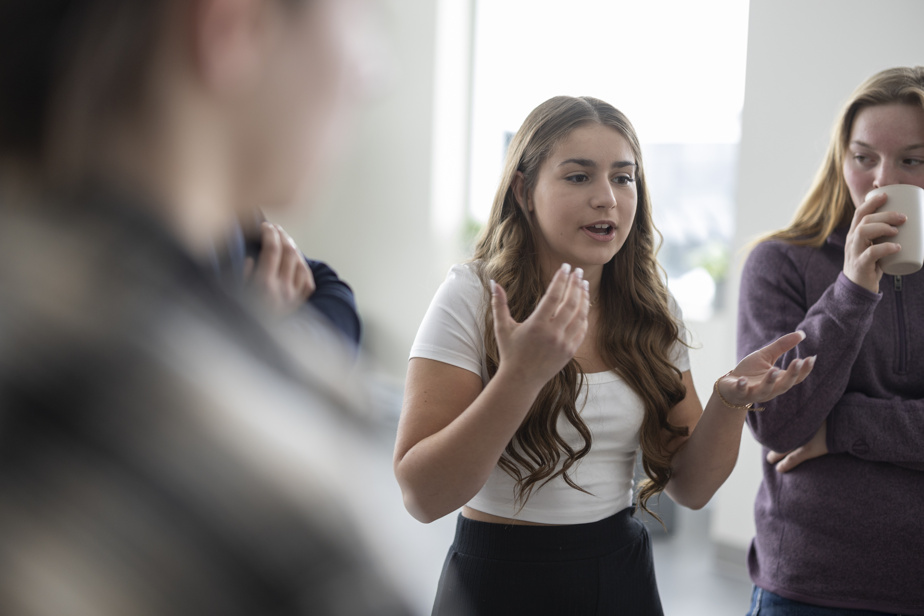Ten teenagers from the four corners of Quebec dared a crazy bet, hilariously ambitious, unless I’m mistaken, never seen here: to document the five years of their high school, step by step, and all the same on camera. The result, Being a Teen, a 12-episode documentary series produced by KOTV, is broadcast starting this Thursday on Télé-Québec.
We’ve watched the first three hour-long episodes and let’s say it up front: it’s candy. Touching, tender or disturbing at times; we see these young people growing up before our eyes (growth curves to support), living, dreaming, crying and laughing, from their entry into high school until their prom. All while going through a global pandemic, it should be remembered (episodes 5 to 8).
Diversity is in the spotlight: we alternate between a young person in Montreal-North here, then in Alma there, via Laval, Mashteuiatsh or Boucherville. A young participant lives on a farm. Two come from elsewhere (Syria and Rwanda). We can’t imagine the logistical challenges of filming here.
It’s hard to remain indifferent to how far they’ve come, especially since the series is not purely chronological, but skilfully offers a number of back and forths between present (17 years) and past (12 years), in order to appreciate all the upheavals in progress. Think: physical (some people really change their faces!), psychological, academic and, of course, emotional.
Hopes, disappointments, dreams, everything happens, year after year, and in all sincerity. The participants obviously have no filter and also reveal themselves with a searing authenticity, as only young adolescents can do. “I don’t tell my mother everything! “, one of them will even say with a laugh (gossip: he’s the son of one of the three directors!), confiding around the age of 13 about his first sips of drink. It gives you an idea of the tone.
We met some of the happy team (three young people were absent) earlier this week, and no, if you want to know everything, they do not regret the adventure. At all. Asked, from time to time pranksters, they answer our questions in a thoughtful manner. They have gotten into the habit of confiding in each other and it shows. All also frankly welcome the “life experience”.
Émy went through a bereavement in Secondary 3 and doesn’t hide it: “It was mentally difficult, so I really didn’t feel like adding cameras. » Nevertheless, she persevered and is far from regretting it: “I like to see that I managed to get through it! “, she congratulates herself. “And then, if someone can recognize themselves in one of our journeys, I think we will have achieved something,” adds Rachel-Andrée, who underlines the extent to which adolescence represents a small “eternity” in the series : “You start out as a little child, and you pick yourself up, in the end, you’re almost an adult! »
The idea for the project was born several years ago, when Ève Déziel’s daughter (content producer) herself completed secondary school. A teacher filmed the entry of his cohort into secondary 1, to broadcast the images five years later. The emotions in the room were palpable. “It sowed something,” she recalls. Then, when her daughter, now an adult, left home, Ève Déziel understood. “I was bored of that: adolescence. I have always loved adolescence. I love teenagers! I find them authentic, never boring! » And then this period of life, certainly pivotal, passes so quickly. Hence the slightly crazy idea of filming around ten of them (and she salutes the audacity of her production house in passing), in order to illustrate this fundamental “transformation”.
Be careful, not just any way, but above all without judgment. By giving them a voice. Their. Just them, we will have understood it. And obviously, they appreciated it.
Marisol Aubé, directing (with Paul-Maxime Corbin and Pierre Gagnon), also hopes that this series “will bring us back to: what it’s like to be a teenager,” she summarizes. It hasn’t changed that much! […] It seems that adults say to themselves that things have changed so much, they are afraid of no longer connecting. […] But you have to remember, what it’s like to be a teenager! Because everyone has something to learn from them,” she says.
So what, exactly, is being a teenager? In general: “test lots of things, live experiences”, “a pivotal period”, “find your place”, in short, “discover who you are […] and not what others want you to be…”, answer our talkative interlocutors, who have a lot to say on the issue.
